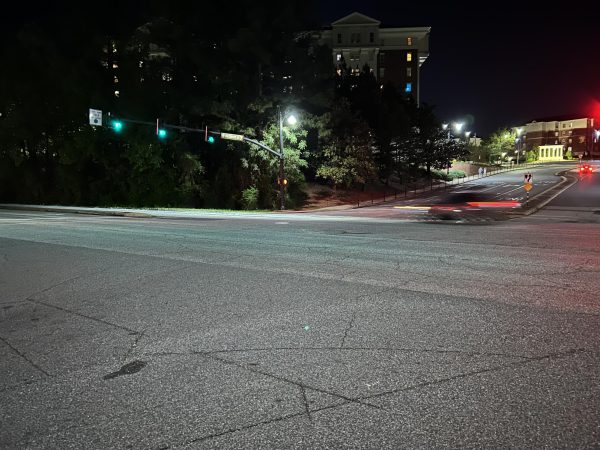SGA SENATE RECAP – 2/2/23
February 8, 2023
The Student Government Association Senate passed nine pieces of legislation and sent four to committees on Thursday, Feb. 2.
Bill to mandate senators to attend monthly tabling events – Passed
The SGA unanimously passed a bill that requires senators to attend tabling events to interact with and greet students and answer questions that they may have about the SGA.
According to the legislation, “Senate leadership along with the director of initiatives” will coordinate the Senate tabling events. The events will be held on a “certain day” during the first week of the “six full academic months.”
Senators are required to attend at least two of these events before their terms expire.
The event coordinators will determine when and where the tabling events will be held. The events must be held in three academic buildings, one of which must house a specific college.
This is the second time this bill was sent to the Senate floor after being sent to the Rules Committee.
Constitutional amendment to change the timing of State of School Address – Passed
The SGA unanimously passed a constitutional amendment to move the State of the School Address to take place in “January of each year.”
The address used to take place on the second Tuesday of November each year. SGA President Madeline Martin, the author of the resolution, said the reason for changing the date was that the previous date overlapped with many local, state and national election days.
Act to Implement three Free Little Libraries on campus – Passed
The SGA unanimously passed an act that requires the First Year Council to install and maintain three Free Little Libraries on campus.
The libraries will be free to use and there will be no penalties for keeping books, but students are encouraged to leave a book every time they take one.
The act also encourages FYC members to hold a “book donation drive” as their First Year Council Service Day project each year. The drive promotes the donation of books of “all genres, levels, and backgrounds.”
The three Little Free Libraries will come pre-built and will be paid for by the Executive SGA budget, totaling around $1,500. The libraries will be bought directly from Little Free Library, a nonprofit organization based in Minnesota.
This decision comes after this act was sent to the Academic Affairs Committee during a previous Senate session.
Bill instituting public record of FYC legislation passed – Passed
The SGA unanimously passed a bill that requires the posting of passed FYC legislation to the SGA website along with Senate legislation.
The legislation also amends the duties of the Secretary of the First Year Council to include maintaining final copies of passed FYC legislation and sending them to the SGA Webmaster.
The bill does not require the posting of failed FYC legislation, nor does it specify posting past legislation to the website.
The bill was authored by Sen. John Richardson and First Year Councilor Bryce Holt.
“Right now, we’re [FYC] kind of an obscure part of SGA,” Holt said. “We want to add some sort of legitimacy to … our resolutions and pieces of legislation.”
Bill to ensure SGA and Faculty Senate are aware of each other’s activities – Sent to Rules Committee
The SGA sent a bill that would specify the Executive Vice President’s liaison duties between the Senate, First Year Council and Faculty Senate to the Rules Committee.
The bill would require the Vice President to inform the Faculty Senate, First Year Council and the Senate of each of the other organizations’ activities “on a regular basis,” according to the legislation.
If the Vice President is not able to attend Faculty Senate meetings, then another member of the Executive Council or a member of the vice president’s cabinet would act as the liaison in their place.
Currently, the Code of Laws states that the Executive Vice President shall act as a liaison between the three with no specifications on how that duty will be carried out.
Senator Maria Derisavi, the author of the bill, said she believes the bill would allow the SGA to have a more productive collaboration with the Faculty Senate.
“There are so many times that I had ideas for legislation regarding grades or anything having to do with faculty approval that wasn’t able to be pursued because we didn’t have good connections … to Faculty Senate,” Derisavi said.
Resolution calling for an increase in drug awareness and harm reduction– Passed
The SGA Senate unanimously passed a resolution that encourages the University to provide a “comprehensive, peer-based drug education” through Project Health.
It also calls for the University to support student organizations providing independent drug education and training. Additionally, it calls for the University to “create educational modules or programs” about drug awareness and harm reduction.
The resolution cites the peer-based drug education of the United Nations Office on Drugs and Crime, which says that it allows peers to educate each other about “healthy” norms and behaviors while “challenging” those that are unhealthy.
The legislation states that while the University’s Project Health does offer education about nicotine, alcohol and prescription drugs, it does not offer education on “opioids, stimulants, and other controlled drugs.”
According to the Centers for Disease Control and Prevention, there were 1029 deaths from opioid overdoses in Alabama in 2020. In the same year, the CDC listed Alabama as having the most opioid prescriptions per capita, with 80 prescriptions per 100 people
The University of Alabama branch of Students for Sensible Drug Policy, an organization focused on “honest drug education” and “harm reduction,” endorsed the bill and encouraged to acknowledge the “drug culture” at the UniversityUA.
“We want students to feel comfortable asking questions and sharing experiences without being afraid,” said Marlie Thompson, the president of the UniversityUA’s branch of Students for Sensible Drug Policy.
The resolution was sponsored and endorsed by 20 senators, professors, and student organizations, including SGA President Madeline Martin.
Resolution calling UA to reevaluate its Medical Emergency Assistance Policy – Passed
The SGA Senate unanimously passed a resolution that called for the University to use “more clear and specific language” in its Medical Emergency Assistance Policy, especially pertaining to its medical amnesty policy.
The legislation also calls for the University to reevaluate its MEAP regarding other universities’ “effective policies” towards publicizing their policy.
The resolution cites the University of Georgia’s Medical Amnesty Policy, which states students should not be afraid to call 911 during a drug overdose, as a “clear and concise example of a Medical Amnesty Policy.”
Karina Collins, the legislation’s author and senator for the College of Human and Environmental Sciences said she would like to see the University display a similar message on the front page of the Office of Student Conduct’s website in large, bold letters.
Collins also said she wishes to see the MEAP posted on other university websites, the University’s drug policy and professors’ syllabi.
The author added that she would like to see the University dedicate its own website to the MEAP and paste posters around the Student Center to advertise the policy.
Resolution condemning antisemitism on campus – Passed
The SGA unanimously passed a resolution that states the SGA “adamantly opposes all forms of antisemitism on or off” campus. It also states that SGA supports increased protection and celebration of Jewish organizations and students.
The resolution is in response to the chalk drawings that appeared on the University’s campus on Jan.uary 26th. The drawings voiced support for rapper Kanye West’s views on Jewish people after he posted antisemitic remarks on his Twitter.
Similar chalk drawings were made on the University of Florida’s campus.
Tyler Tannehill, one of the authors of the bill, said even though the SGA passed the resolution, it can’t end with this statement.
“We have to not react but be proactive in offering solutions,” Tannehill said.
Elizabeth Prophet, the co-author author of the resolution, said she wants to continue working with student and Jewish organizations to provide educational seminars and assistance from the UAPD to ensure safety for Jewish students.
However, Prophet said she doesn’t want to rush new legislation, so she’ll continue to work with these organizations despite her waning term.
The SGA had already released a statement condemning the chalk drawings on Jan. 27, but Prophet said this was the Senate acting on its own “in tandem” with the rest of the SGA to jointly drive out instances of hate on campus.
Resolution calling for UA’s acknowledgement for the need to increase student wages – Sent to Student Affairs Committee
The SGA sent a resolution to the Rules Committee calling for the University and the Division of Financial Operation/Human Resources to increase student wages. Additionally, it encourages the organization of a student worker pay scale that is “readily available for future use.”
Currently, student workers are paid varying wages depending on the department that employs them. Some departments pay minimum wage while some can pay as high as $20 and possibly higher.
Xzarria Peterson, the author of the resolution, said “closing the gap” in the pay scale would allow students to be paid more.
The resolution cites Emory University’s decision to reduce the range in its current pay scale between $9 and $12 by raising the minimum wage to $15 by 2024. This decision is predicted to cost Emory $625,000 to $800,000 annually.
“I’m not saying the University here has to do $15, but maybe like $11 or $12 is probably a really good starting point, and they can work on increasing that in future years,” Peterson said.
Peterson also said that increasing student wages might encourage more students to find jobs on campus despite having to work around their social life and schoolwork.
Act to implement Meet FYC Day – Sent to Student Affairs Committee
The SGA sent an act to the Student Affairs Committee that would implement a Meet FYC Day that would allow students to ask FYC members questions and bring up their concerns.
The event would require FYC members to be stationed outside the dorms they represent with a Bama Asks QR code that students can scan to further communicate with the FYC.
Julienne Pharrams, the author of the resolution and the Speaker of the FYC, said the act could increase the visibility of FYC.
“A lot of freshman students on campus don’t fully know the role of the FYC or how to get in contact with us,” Pharrams said. “Our job is to represent our constituents and I feel like this is just a way to make sure that that happens.”
Bill to require electronic voting in the Senate – Sent to the Rules Committee
The SGA sent a bill that would require electronic voting via Microsoft Forms in the Senate to the Rules Committee. The bill, if passed later, would go into effect next semester.
Senators would not be allowed to cast their vote electronically if they are not present at the Senate meeting.
If a senator or their proxy cannot electronically vote, then their vote would be recorded by the secretary of the Senate. Electronic voting will be forgone if there is no way for the Senate to record votes electronically.
Electronic voting would not supersede roll-call voting in the case roll-call voting is mandated.
Tyler Tannehill, the bill’s author and a senator for the College of Arts and Sciences, said the legislation would allow students to track senators’ votes or abstentions individually, increasing transparency.
“What this bill does … is help democratize and get students to care more about what their respective representatives [are] doing,” Tannehill said.
Last semester, Tannehill introduced a similar bill that would have also required electronic voting. The bill was tabled in committee and has not been revisited. The bill came after Tannehill and several other senators began publishing their individual voting records.
Tannehill said he reintroduced this bill because of his bill that removed the tabling power of committees passed.
“This is a good and necessary step to have more openness and accountability of student leaders,” Tannehill said. “The rules have to change, whether it’s committee or whether it’s electronic voting … to enable minority voices in government.”











